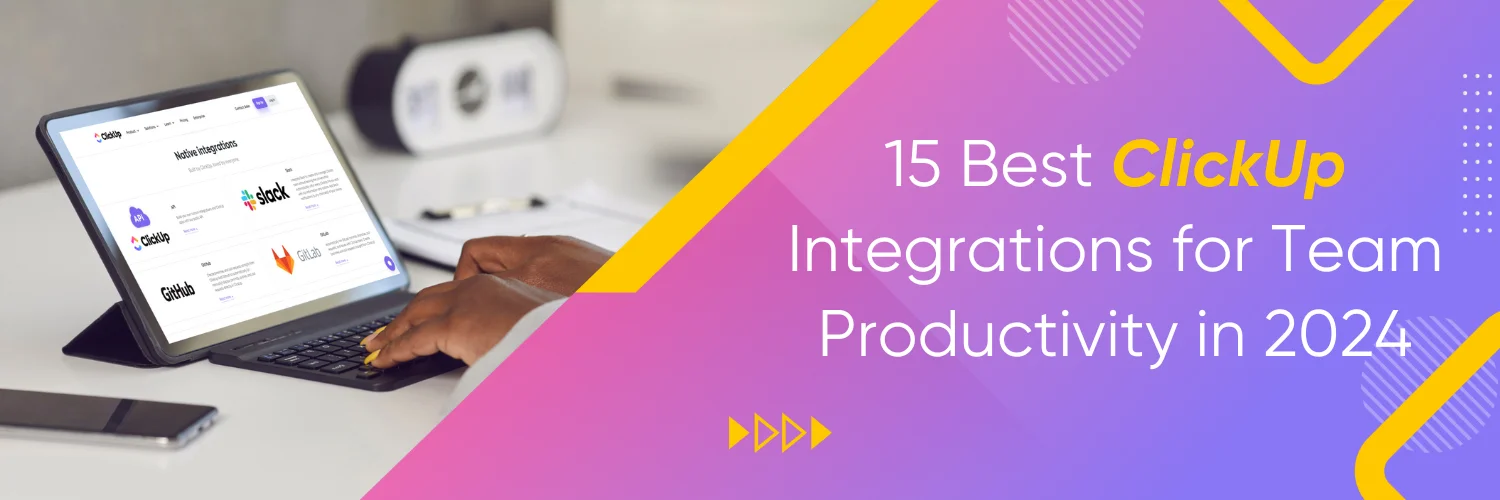Free Courses for Project Management

Project management is a vital skill in today’s business world. Whether you’re a seasoned project manager or just starting out, continuous learning is essential for staying ahead. Fortunately, there are numerous free online courses available to enhance your project management knowledge and skills. In this article, we present the top 10 free courses that can help you develop and refine your project management expertise.
In 2023, there are several excellent free courses available for project management. Here are the top 10 best free courses for project management:
#1 “Project Management Fundamentals” by Coursera:
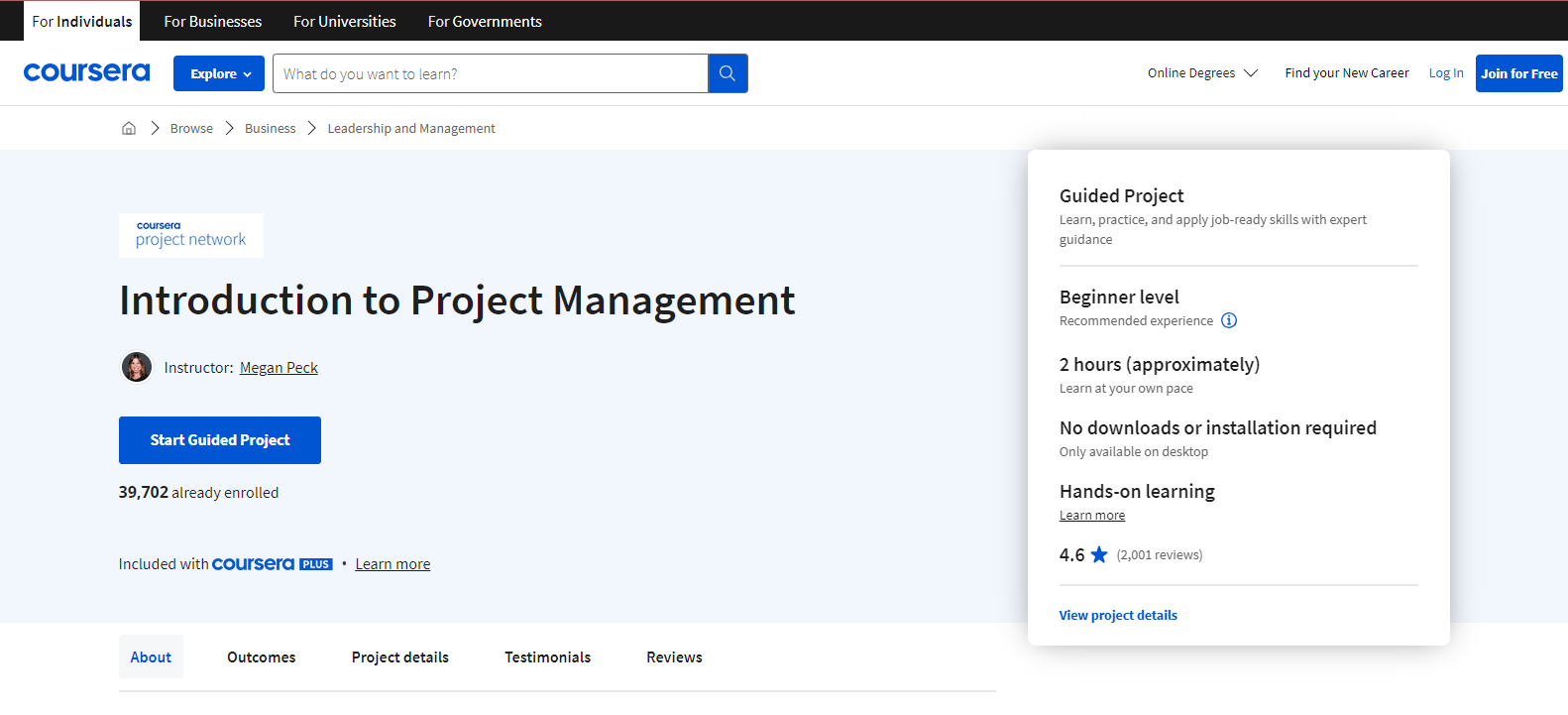
Source: Coursera
This course provides a comprehensive overview of project management fundamentals, including project planning, scheduling, and budgeting.
Certificate:
Upon successful completion of the “Project Management Fundamentals” course by Coursera, participants receive a certificate of completion. This certificate is issued by Coursera, one of the leading online learning platforms, in collaboration with the course provider.
Curriculum:
The “Project Management Fundamentals” course aims to provide learners with a solid foundation in project management principles and practices. The curriculum covers the following topics:
- Introduction to Project Management: An overview of project management concepts, including project life cycles, stakeholders, and key roles and responsibilities.
- Project Initiation: Understanding project initiation processes such as defining project objectives, conducting feasibility studies, and identifying project constraints.
- Project Planning: Techniques for developing comprehensive project plans, including defining project scope, creating work breakdown structures, and estimating resources and timeframes.
- Project Execution: Managing project activities, coordinating team members, and ensuring the project stays on track to achieve its objectives.
- Project Monitoring and Control: Implementing project monitoring systems, tracking progress, managing risks, and making necessary adjustments to keep the project on schedule and within budget.
- Project Closure: Wrapping up projects, conducting post-project evaluations, and capturing lessons learned for future projects.
Customer Review:
Overall, the “Project Management Fundamentals” course has received positive feedback from learners. Here is a sample customer review:
“The course provided a comprehensive overview of project management principles and practices. The content was well-structured, and the instructors presented the material in an engaging manner. The assignments and quizzes helped reinforce the concepts learned, and the discussion forums provided opportunities to interact with fellow learners. I found the course to be highly valuable and would recommend it to anyone looking to develop their project management skills.”
Pros:
- Comprehensive Content: The course covers all the essential aspects of project management, providing learners with a strong foundation in the subject.
- Engaging Instruction: The instructors deliver the material in an engaging and accessible manner, making it easy to grasp complex concepts.
- Interactive Assignments: The course includes assignments and quizzes that allow learners to apply their knowledge and reinforce their understanding.
- Peer Interaction: The discussion forums enable learners to interact with peers, share insights, and learn from others’ experiences.
Cons:
- Limited Practical Application: While the course covers project management principles in-depth, some learners may desire more hands-on exercises or real-world case studies to further enhance their practical skills.
- Self-Paced Structure: While the flexibility of a self-paced course is beneficial for many learners, some individuals may prefer a more structured schedule or instructor-led sessions.
- No Accreditation: Although the course provides a certificate of completion, it does not offer an industry-recognized accreditation, which may be important for certain career paths or organizations.
#2 “Project Management Basics” by Udemy:
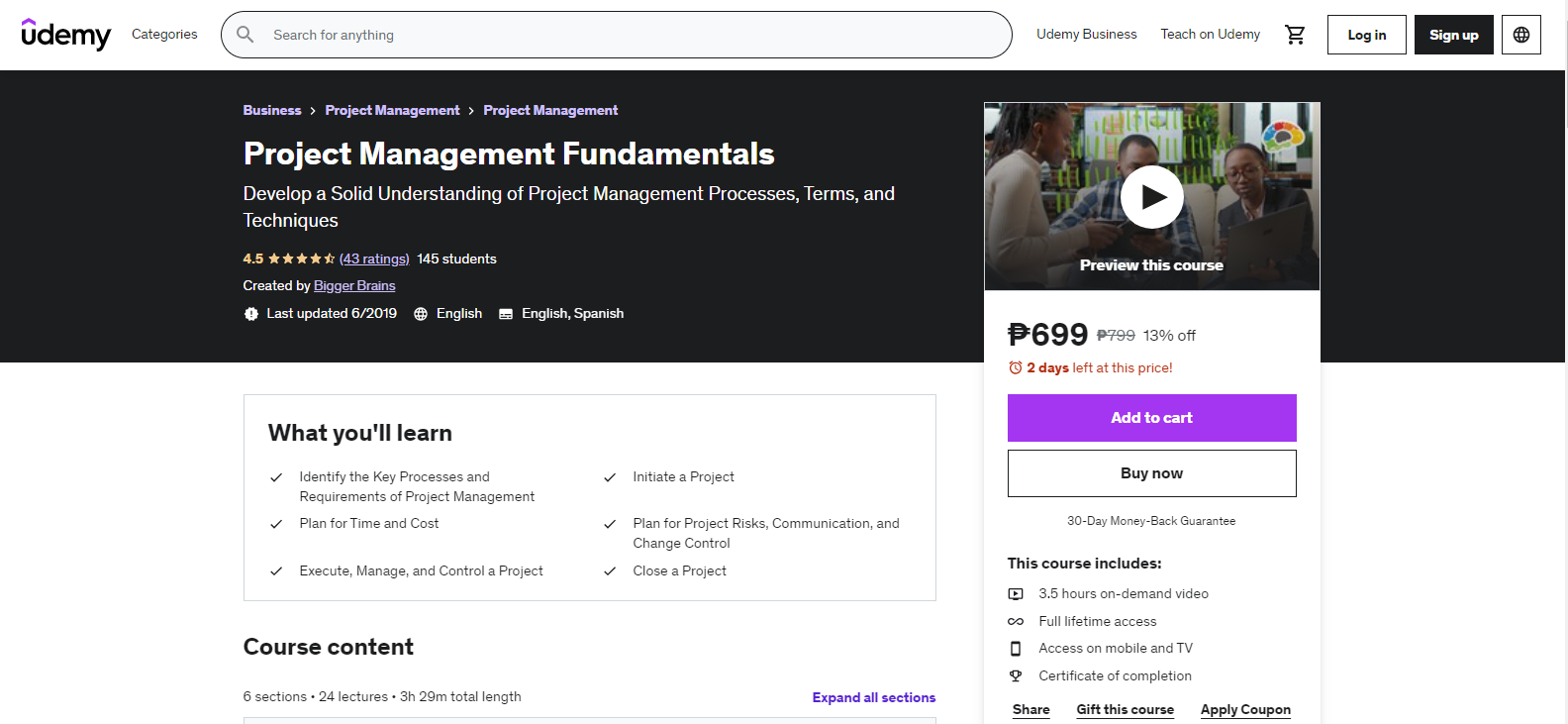
Source: Udemy
This course covers the essential concepts and techniques of project management, including defining project goals, creating work breakdown structures, and managing project risks.
Certificate:
Upon completion of the “Project Management Basics” course by Udemy, participants receive a certificate of completion. This certificate serves as proof of their successful engagement in the course and their understanding of the fundamental concepts of project management.
Curriculum:
The “Project Management Basics” course offered by Udemy covers a comprehensive range of topics related to project management. The curriculum is designed to provide participants with a solid foundation in project management principles and techniques. Some of the key topics covered in the course may include:
- Project initiation: Understanding how to define project objectives, scope, and stakeholders, and how to develop a project charter.
- Project planning: Exploring the process of creating a project plan, including tasks, resources, schedules, and budgets.
- Project execution: Learning how to implement the project plan, manage tasks, track progress, and address potential risks and issues.
- Project monitoring and control: Understanding the importance of monitoring project performance, tracking progress, and making necessary adjustments.
- Project closure: Exploring the activities involved in closing a project, including conducting post-project reviews and documenting lessons learned.
Customer Review:
The customer reviews for the “Project Management Basics” course on Udemy have been generally positive. Participants have appreciated the course for its clear explanations, practical examples, and interactive exercises. Many reviewers have mentioned that the course provides a solid understanding of project management fundamentals, making it suitable for beginners or individuals looking to refresh their knowledge. Several customers have also highlighted the instructor’s expertise and engaging teaching style as key strengths of the course.
Pros:
- Comprehensive curriculum: The course covers all the essential aspects of project management, providing a well-rounded understanding of the subject.
- Practical examples and exercises: The inclusion of practical examples and interactive exercises helps participants apply the concepts learned in real-world scenarios.
- Suitable for beginners: The course is designed to cater to individuals with little to no prior knowledge of project management, making it accessible to beginners.
- Engaging instructor: The instructor’s expertise and engaging teaching style contribute to a positive learning experience.
- Certificate of completion: Participants receive a certificate upon completing the course, which can enhance their professional credentials.
Cons:
- Lack of advanced topics: Some participants have noted that the course focuses primarily on the basics of project management, which may not be sufficient for those seeking more advanced knowledge or techniques.
- Limited interaction: As an online course, there may be limited opportunities for direct interaction with the instructor or other participants, which could hinder collaborative learning experiences.
- Self-paced format: While the self-paced format of the course offers flexibility, it may require participants to maintain self-discipline and motivation to complete the course successfully.
#3 “Project Management Principles and Practices” by Alison:
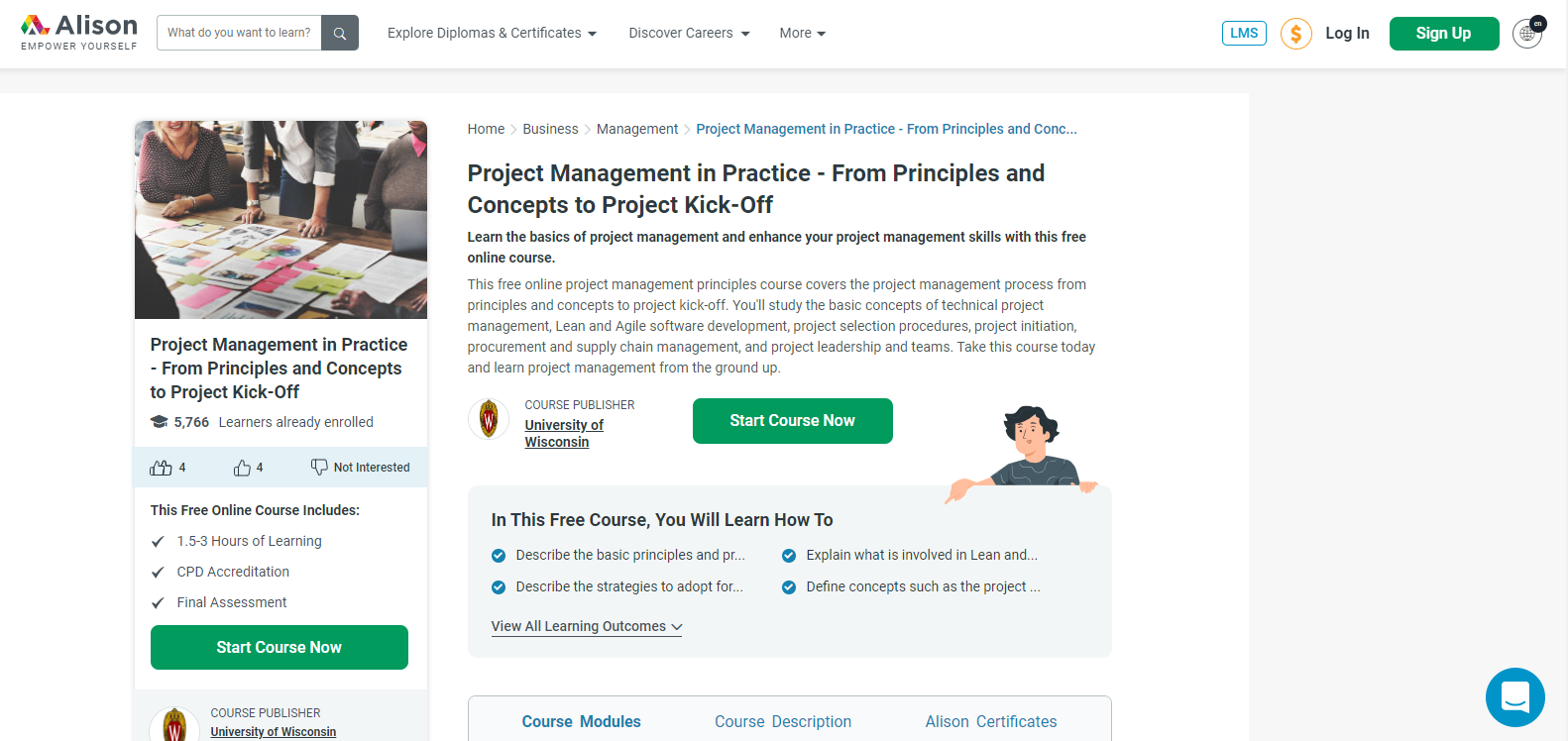
Source: Alison
This course explores the key principles and practices of project management, including project initiation, planning, execution, monitoring, and closing.
Curriculum:
The Project Management Principles and Practices course offered by Alison provides a comprehensive overview of project management concepts and techniques. The curriculum is designed to equip learners with the necessary knowledge and skills to effectively manage projects across various industries and sectors. The course covers a wide range of topics, including project planning, scope management, risk assessment, team coordination, communication strategies, and project evaluation.
The curriculum explores essential project management tools and techniques. It familiarizes learners with popular project management methodologies, such as Agile, Waterfall, and Scrum, and demonstrates their practical applications in different project scenarios. The course also emphasizes the significance of effective stakeholder management and provides strategies for engaging and collaborating with project stakeholders.
Customer Review:
The Project Management Principles and Practices course by Alison has received positive feedback from many learners. One customer review highlights the course’s comprehensive curriculum, which covers all the essential aspects of project management in a clear and concise manner. The customer appreciated the practical examples and case studies incorporated into the course material, as they provided real-world context to the concepts discussed.
Pros:
- Comprehensive curriculum covering all essential project management aspects.
- Clear and concise explanations of concepts.
- Practical examples and case studies for better understanding.
- Introduction to various project management methodologies.
- Emphasis on stakeholder management and collaboration.
Cons:
- Some learners may prefer more interactive elements, such as quizzes or exercises, to reinforce learning.
- The course may benefit from additional in-depth discussions on advanced project management techniques for experienced professionals.
#4 “Agile Project Management” by LinkedIn Learning:
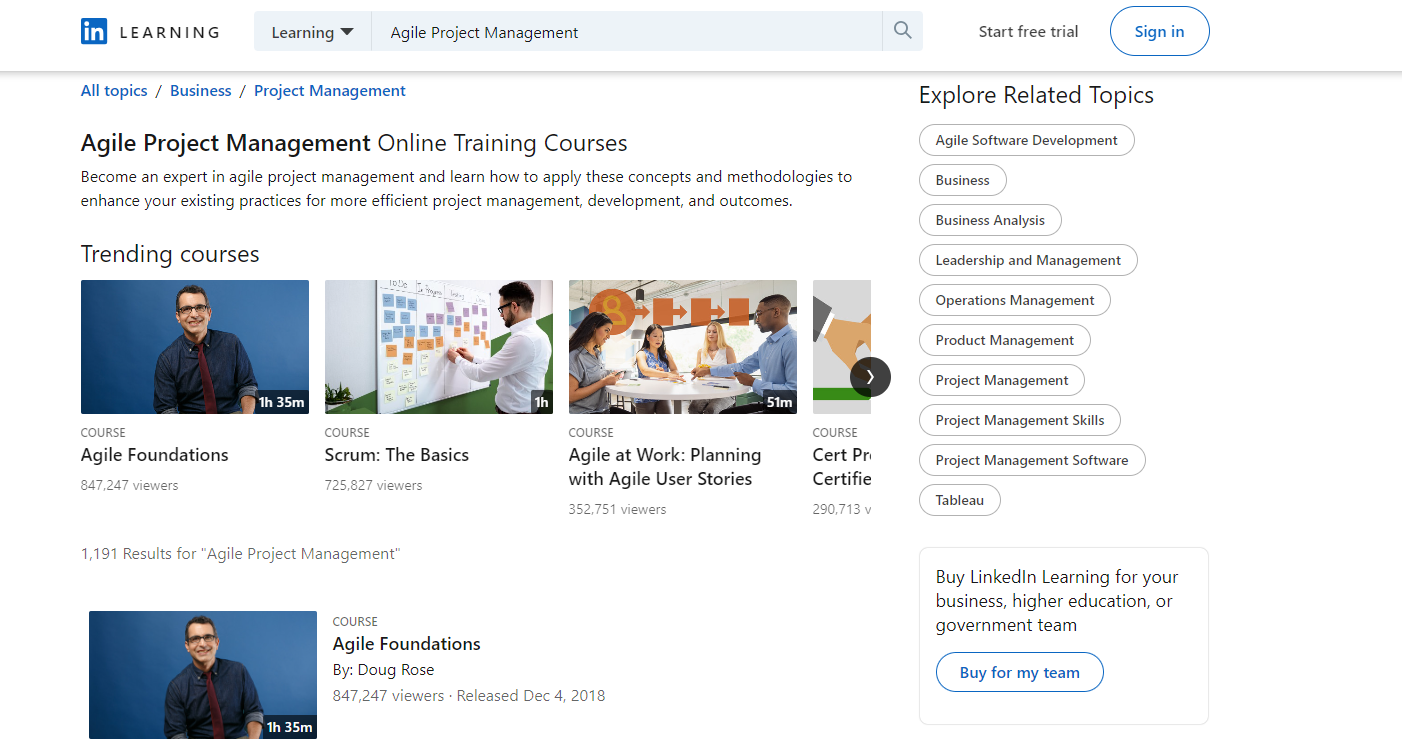
Source: LinkedIn
This course focuses on the principles and practices of agile project management, including agile methodologies like Scrum and Kanban.
Certificate:
Upon completion of the “Agile Project Management” course by LinkedIn Learning, participants receive a certificate of completion. This certificate serves as proof that they have successfully completed the course and gained knowledge in the field of Agile project management. It can be a valuable addition to their professional portfolio and can be shared with potential employers or clients to showcase their expertise in Agile methodologies.
Curriculum:
The “Agile Project Management” course offered by LinkedIn Learning covers a comprehensive curriculum that provides participants with a solid understanding of Agile principles and practices. The course typically includes the following topics:
- Introduction to Agile: An overview of Agile methodologies, its history, and the values and principles that underpin Agile project management.
- Agile Manifesto and Principles: A detailed exploration of the Agile Manifesto and the twelve principles that guide Agile project management.
- Scrum Framework: An in-depth look at the Scrum framework, including roles and responsibilities (Scrum Master, Product Owner, Development Team), ceremonies (daily stand-up, sprint planning, sprint review, sprint retrospective), and artifacts (product backlog, sprint backlog, burndown chart).
- Kanban Method: An introduction to the Kanban method, its principles, and how it can be used to manage and visualize work in an Agile project.
- Lean Thinking: An overview of lean principles and how they can be applied to Agile project management to eliminate waste, improve efficiency, and deliver value to customers.
- Agile Estimation and Planning: Techniques and approaches for estimating and planning Agile projects, including user stories, story points, velocity, and release planning.
- Agile Metrics and Reporting: An exploration of various metrics and reporting mechanisms used in Agile projects to track progress, identify bottlenecks, and make data-driven decisions.
- Agile Team Collaboration and Communication: Strategies and tools for fostering effective collaboration and communication within Agile teams, including agile ceremonies, information radiators, and communication channels.
Customer Review:
The “Agile Project Management” course by LinkedIn Learning has received positive feedback from many participants. Here is a sample customer review:
“I found the Agile Project Management course on LinkedIn Learning to be extremely informative and well-structured. The instructor explained the concepts clearly and provided practical examples that helped me grasp the Agile methodologies easily. The course materials were comprehensive, and the exercises and quizzes reinforced my learning. I feel confident in applying Agile principles to my projects now. Highly recommend this course for anyone interested in Agile project management.” – John D.
Pros:
- Comprehensive curriculum: The course covers a wide range of Agile concepts, frameworks, and techniques, providing participants with a thorough understanding of Agile project management.
- Well-structured and engaging: The course is well-organized, with clear explanations and practical examples that make it easy to follow and apply the concepts learned.
- Experienced instructor: The instructor has expertise in Agile methodologies and effectively communicates complex ideas in a simple and understandable manner.
- Practical exercises and quizzes: The course includes hands-on exercises and quizzes that reinforce learning and help participants apply Agile principles in real-world scenarios.
- Reputable platform: LinkedIn Learning is a trusted platform for online education, and their courses are developed by industry experts, ensuring quality content.
Cons:
- Limited interaction: As an online course, there may be limited opportunities for direct interaction with the instructor or other participants, which some learners may prefer in a classroom setting.
- Limited customization: The course content is pre-determined, so participants may not have the flexibility to tailor the curriculum to their specific needs or interests.
- Self-paced learning: While self-paced learning can be advantageous for some, it may require self-discipline and motivation to complete the course within a given timeframe. Some individuals may prefer a more structured classroom environment.
#5 “Project Management for Beginners” by ProjectManagement.com:
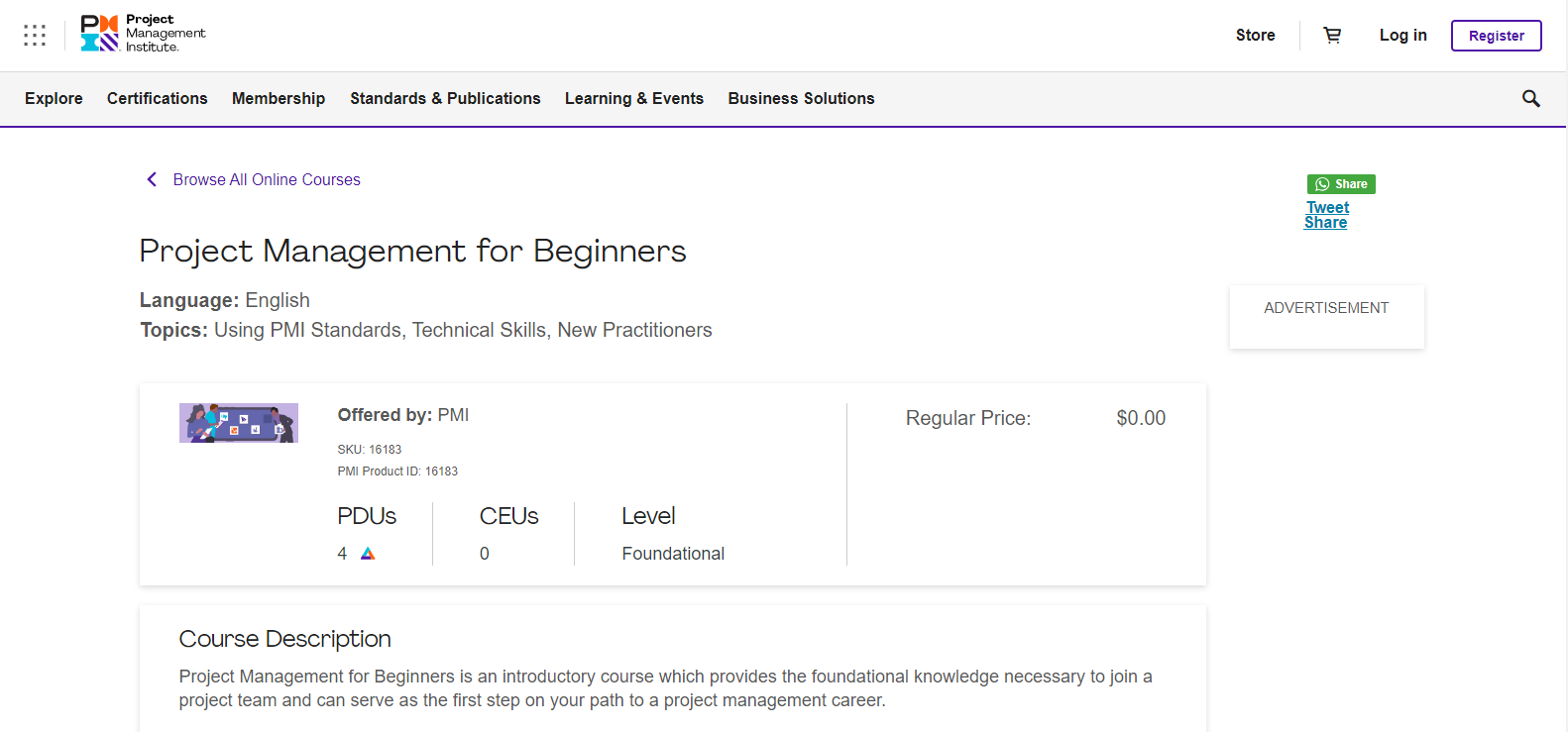
Source: ProjectManagement
This course provides a beginner-friendly introduction to project management, covering essential topics such as project lifecycle, stakeholder management, and communication.
Certificate:
The availability of a certificate may vary depending on the specific course or platform.
Curriculum:
The curriculum of a project management course typically covers various aspects of project management, including project initiation, planning, execution, monitoring, and closure. It may also cover topics such as project scope, time management, cost management, risk management, and stakeholder engagement. The curriculum often includes real-world examples, case studies, and practical exercises to enhance the learning experience.
Pros:
- Introduction to foundational concepts: These courses provide an introduction to the fundamental principles, techniques, and terminology used in project management.
- Structured learning: Courses typically follow a structured curriculum that guides learners through key project management concepts, tools, and methodologies.
- Practical skills development: Many courses incorporate practical exercises, case studies, and simulations to develop hands-on project management skills.
- Flexibility: Online project management courses often offer flexibility in terms of scheduling, allowing learners to study at their own pace and convenience.
Cons:
- Varied depth and quality: The depth and quality of project management courses can vary significantly, depending on the provider and the course itself. Some courses may provide only a basic introduction, while others may offer more comprehensive content.
- Limited interaction: Online courses may have limited opportunities for direct interaction with instructors or fellow learners compared to in-person or instructor-led training.
- No hands-on experience: While project management courses can provide theoretical knowledge and simulated exercises, they may not offer the same level of practical experience as real-world projects.
#6 “Project Management Essentials” by Skillshare:
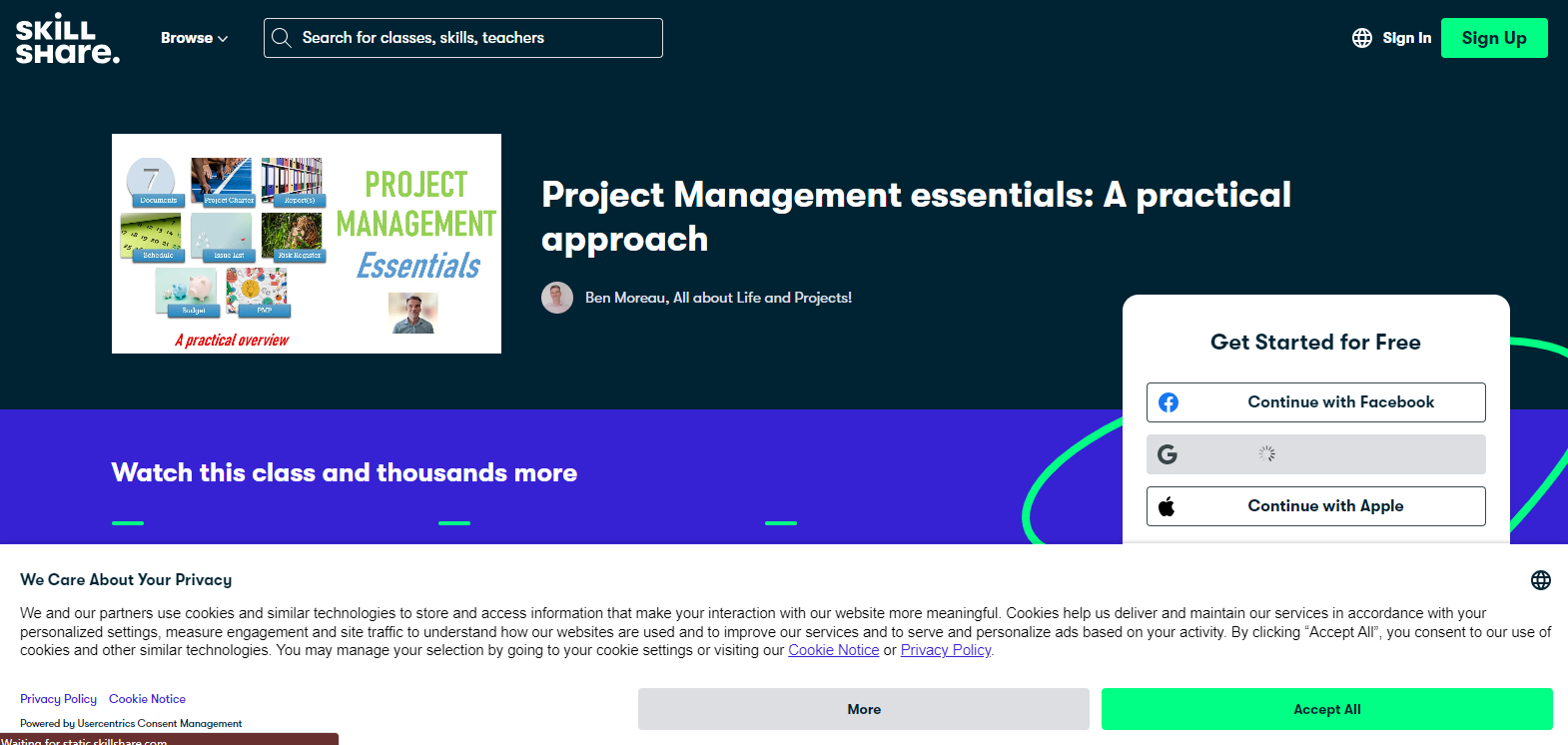
Source: Skillshare
This course offers an overview of project management essentials, including project initiation, planning, execution, and closure.
Certificate:
No specific certificate mentioned on the course page.
Curriculum:
The course covers the following topics:
- Introduction to project management for creatives
- Defining project goals and objectives
- Planning and organizing projects
- Managing project timelines and budgets
- Communication and collaboration in project management
- Troubleshooting and problem-solving in projects
- Project closure and evaluation
Customer Review:
There is 48% of 5 Star reviews of this course.
Pros:
- Course tailored for creative professionals, focusing on their unique project management needs.
- Practical guidance on project planning, budgeting, and communication.
- Access to the broader Skillshare community for discussions and collaboration.
Cons:
- No specific certificate mentioned, so it may not be suitable if you require a formal certification.
- Limited information available on the course content and instructor’s credentials without accessing the course.
#7 “Project Management Fundamentals” by FutureLearn:
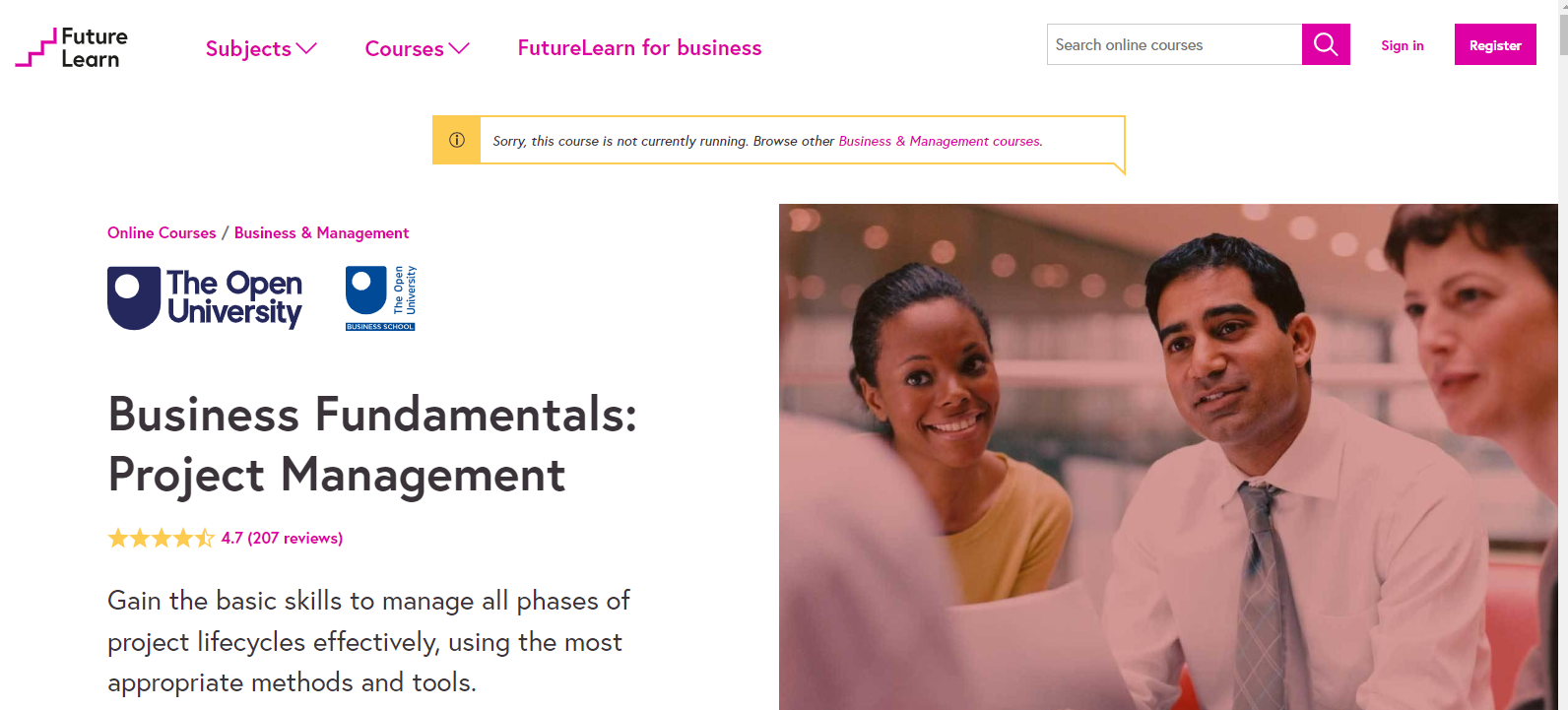
Source: Future Learn
This course covers the key concepts and techniques of project management, including project planning, risk management, and project evaluation.
Certificate:
The “Project Management Fundamentals” course by FutureLearn provides a certificate of completion upon successfully finishing the course. This certificate serves as proof that you have gained the necessary knowledge and skills in project management fundamentals.
Curriculum:
The curriculum of the “Project Management Fundamentals” course covers essential topics and concepts related to project management. It typically includes modules on project initiation, planning, execution, monitoring and control, and project closure. The course delves into key project management methodologies, such as Agile and Waterfall, and explores the various stages of the project lifecycle. Additionally, it may cover topics such as stakeholder management, risk assessment, communication strategies, and team dynamics. The curriculum is designed to provide a solid foundation in project management principles and practices.
Customer Review:
The course has generally received positive reviews from customers who have completed it. Participants appreciate the comprehensive nature of the curriculum, which covers a wide range of project management topics. Many reviewers highlight the practicality of the course content, as it focuses on real-world scenarios and offers actionable insights. Additionally, learners find the course engaging and well-structured, making it easy to follow and understand. The instructors and facilitators are often praised for their expertise and ability to effectively convey complex concepts.
Pros:
- Comprehensive curriculum: The course covers a broad range of project management topics, providing a comprehensive understanding of the subject.
- Practical approach: The content is practical and applicable to real-world project management scenarios, enabling learners to implement their knowledge effectively.
- Engaging and well-structured: The course materials are engaging, and the lessons are well-structured, making it easy to grasp the concepts and stay motivated.
- Expert instructors: The instructors possess expertise in project management and effectively communicate complex ideas.
Cons:
- Limited depth: Some learners may find that certain topics are covered only at a surface level, without delving into advanced or specialized areas of project management.
- Lack of personalized feedback: As an online course, there may be limitations in providing personalized feedback to individual learners, which could be valuable for further improvement.
- Limited interaction: Due to the online nature of the course, there may be limited opportunities for learners to engage with instructors and fellow participants, which could hinder collaborative learning experiences.
#8 “Introduction to Project Management” by LinkedIn Learning:
This course provides an introduction to the principles, tools, and techniques of project management, including project scope management, scheduling, and budgeting.
Certificate:
Upon completing the “Introduction to Project Management” course offered by LinkedIn Learning, participants can earn a certificate of completion. This certificate serves as a recognition of their successful completion of the course and demonstrates their understanding of the fundamental concepts and principles of project management.
Curriculum:
The “Introduction to Project Management” course provided by LinkedIn Learning is designed to equip learners with a solid foundation in project management methodologies and techniques. The curriculum covers various essential topics, including:
- Introduction to project management: This section introduces learners to the basic concepts, principles, and terminology associated with project management. It provides an overview of project management frameworks and the role of a project manager.
- Project initiation: Learners will learn how to initiate a project effectively, including defining project objectives, identifying stakeholders, conducting feasibility studies, and creating a project charter.
- Project planning: This section delves into the process of project planning, covering topics such as defining project scope, developing a work breakdown structure (WBS), creating a project schedule, estimating resources and costs, and establishing project baselines.
- Project execution: Participants will learn about the execution phase of a project, including team management, communication strategies, risk management, and quality assurance.
- Project monitoring and control: This module focuses on monitoring project progress, tracking performance metrics, managing changes, and ensuring project quality through effective control mechanisms.
- Project closure: The final section covers project closure activities, such as conducting project reviews, documenting lessons learned, and celebrating project success.
Customer Review:
The “Introduction to Project Management” course by LinkedIn Learning has received positive feedback from many participants. It has been commended for its comprehensive coverage of project management fundamentals and its practical approach to teaching key concepts. The course is appreciated for its clear explanations, engaging content delivery, and relevant real-world examples. Participants have found the course to be well-structured, enabling them to grasp the essential knowledge required for effective project management. Additionally, the flexibility of online learning provided by LinkedIn Learning has been praised, allowing learners to complete the course at their own pace.
Pros:
- Comprehensive coverage of project management fundamentals
- Clear explanations and engaging content delivery
- Practical approach with real-world examples
- Well-structured curriculum
- Flexibility of online learning
Cons:
- Limited depth: Some learners felt that certain topics could be explored in more depth to provide a more thorough understanding.
- Lack of interactivity: The course primarily consists of video lectures, and some participants wished for more interactive elements, such as quizzes or practical exercises, to enhance the learning experience.
#9 “Project Management for Non-Project Managers” by ProjectManagement.com:
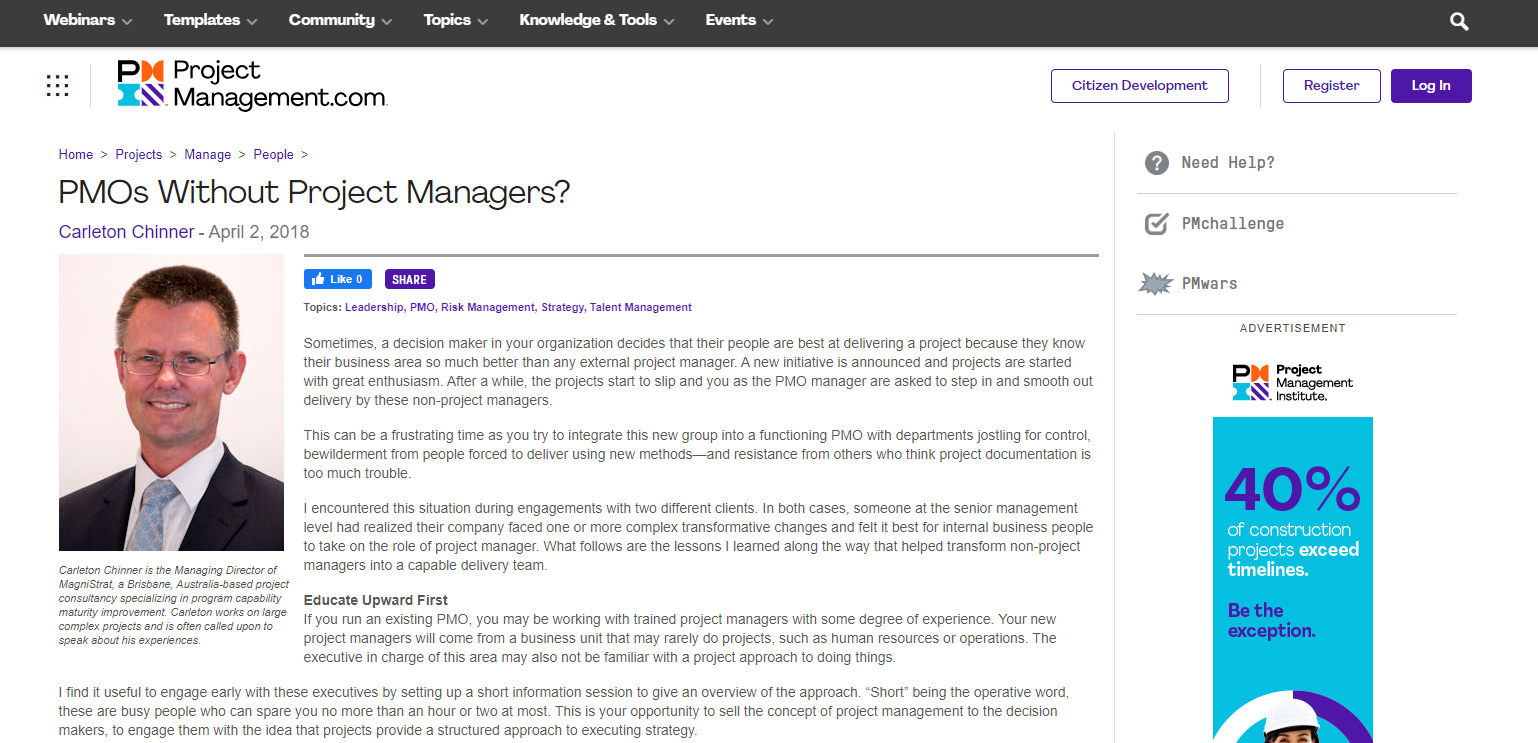
Source: ProjectManagement
This course is designed for individuals who are not traditional project managers but still need to understand project management principles and techniques in their roles.
Certificate:
The “Project Management for Non-Project Managers” course offered by ProjectManagement.com provides a certificate of completion to participants who successfully finish the program. This certificate serves as evidence of the individual’s understanding and knowledge of project management concepts and their application in non-project management roles.
Curriculum:
The curriculum of the course is designed specifically for individuals who are not formally trained or experienced in project management but need to understand and apply project management principles in their work. The course covers a wide range of topics, including project initiation, planning, execution, monitoring and controlling, and project closure. It also addresses key areas such as project scope, time management, cost management, quality management, risk management, and stakeholder management. The curriculum is structured to provide a comprehensive understanding of project management fundamentals and their practical implementation.
Customer Review:
The course “Project Management for Non-Project Managers” has received positive feedback from customers who have participated in the program. Participants appreciate the course’s practical approach and its relevance to their roles. They find the content easy to understand, even for individuals without prior project management experience. Customers also mention that the course provides valuable insights and tools that can be immediately applied to their work, leading to improved project outcomes and better collaboration with project teams.
Pros:
- Practical approach: The course is designed to address the specific needs of non-project managers, providing practical tools and techniques that can be applied directly in the workplace.
- Relevance: Participants find the content highly relevant to their roles, as it focuses on project management principles that can be applied across various industries and sectors.
- Accessibility: The course is accessible to individuals without formal project management training, making it suitable for professionals from diverse backgrounds and roles.
- Comprehensive coverage: The curriculum covers a wide range of project management topics, ensuring that participants gain a holistic understanding of project management principles and practices.
Cons:
- Limited depth: As the course is aimed at non-project managers, the content may not delve into advanced project management concepts or techniques.
- Lack of specialization: Since the course targets a broad audience, it may not address specific industry or sector requirements in depth.
- Self-paced format: While the self-paced nature of the course offers flexibility, some individuals may prefer a more structured and interactive learning environment.
#10 “Introduction to Project Management” by Project Management Institute (PMI)
This course provides a basic introduction to project management principles and practices. It covers key concepts, terminology, and the project management life cycle.
Certificate:
Upon successful completion of the course, participants receive a certificate from the Project Management Institute (PMI). This certificate demonstrates the individual’s understanding of project management fundamentals and can be a valuable addition to their professional credentials.
Curriculum:
The curriculum of the Introduction to Project Management course covers a wide range of topics related to project management. It typically includes:
- Introduction to Project Management: An Overview of the project management discipline, its importance, and its role in organizations.
- Project Life Cycle: Understanding the phases and processes involved in managing a project from initiation to closure.
- Project Integration Management: Techniques and strategies for integrating various project components, such as scope, time, cost, quality, and stakeholders.
- Project Scope Management: Methods for defining, managing, and controlling project scope to ensure successful delivery.
- Project Time Management: Techniques for developing project schedules, estimating durations, and managing project timelines.
- Project Cost Management: Approaches to estimating, budgeting, and controlling project costs throughout the project life cycle.
- Project Quality Management: Principles and practices for ensuring project deliverables meet quality standards and customer expectations.
- Project Risk Management: Strategies for identifying, assessing, and mitigating project risks to minimize their impact on project success.
Customer Review:
Customer reviews of the Introduction to Project Management course by PMI have been generally positive. Many participants appreciate the comprehensive coverage of project management concepts and the practical examples provided throughout the course. The course is often praised for its clear and concise explanations, making it accessible to individuals with varying levels of project management experience. Participants also highlight the interactive nature of the course, which includes exercises and discussions that enhance understanding and application of the concepts.
Pros:
- Comprehensive coverage of project management principles and techniques.
- Practical examples and real-world case studies for better understanding.
- Clear and concise explanations suitable for beginners.
- Interactive elements, such as exercises and discussions, to reinforce learning.
- Recognized certificate from PMI, adding value to professional credentials.
Cons:
- The course may be too basic for experienced project management professionals looking for advanced topics.
- Limited hands-on application of project management tools and software.
- Some participants find the course content to be slightly outdated, lacking the latest industry practices.
Conclusion

These top 10 free courses offer a comprehensive range of knowledge and skills necessary for effective project management. By enrolling in these courses, learners can develop a solid foundation in project management fundamentals, understand Agile methodologies, explore risk management techniques, enhance leadership and communication skills, and gain practical insights into project planning, stakeholder management, quality management, budgeting, project closure, and the use of project management tools and software. Enrolling in these courses is a valuable opportunity to enhance project management expertise without incurring any financial cost
To further boost your business success, consider partnering with Ubique Digital Solutions. Ubique is a leading provider of innovative digital solutions tailored to meet the unique needs of businesses. Their expertise in project management softwares, coupled with their commitment to delivering exceptional results, can help take your business to new heights. Whether you need assistance with project planning, implementation, or optimization, Ubique Digital Solutions has the expertise and experience to support your business growth. Visit their website to learn more and take the next step towards maximizing your business’s potential.
FAQs
Q: Can I earn a certification after completing these free courses?
: While these courses may not offer formal certifications, many of them provide completion certificates or badges that can be added to your professional profile. These certificates can demonstrate your commitment to learning and showcase your knowledge in project management. Additionally, some courses may offer the option to pursue a paid certification after completing the free course.
Q: Are these courses self-paced or do they have set schedules?
The majority of these free courses are self-paced, allowing you to learn at your own convenience and set your own study schedule. You can access the course materials and lectures online, allowing flexibility in completing the coursework. However, it is recommended to check the course details for any specific deadlines or suggested timelines for optimal learning.
Q: How long does it take to complete each course on average?
The duration of each course can vary depending on its content and the amount of time you dedicate to studying. On average, these free courses can take anywhere from a few weeks to a few months to complete, depending on your pace of learning and the complexity of the subject matter. Some courses may provide estimated time commitments to help you plan your learning schedule effectively.





